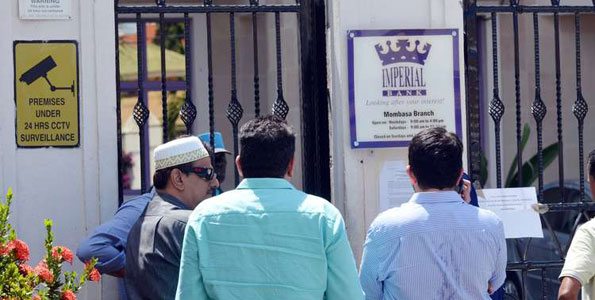The following opinion feature by George Bodo was first published in the Business Daily.
The decision by the Central Bank of Kenya (CBK) to ground Imperial Bank has undoubtedly rattled the markets especially given that this is the second time in as many months that the regulator has had to spring into action, having seized Dubai Bank in August.
But unlike Dubai Bank, where liquidity constraints and the inability to meet financial obligations was the basis on which the regulator grounded it, there was no indication that Imperial Bank could not meet its financial obligations as key balance sheet verticals pointed towards normalcy.
In fact, for its Kenyan operations, the bank reported a net profit of Sh1 billion, its loans-to-deposit ratio remained very healthy at 72 per cent, liquidity ratio was strong at 41 per cent and way above the regulatory minimum of 20 per cent; it also disclosed that its non-performing loans ratio stood at just six per cent, which is a very comfortable level, albeit on the face of it.
Additionally, the bank’s annualised net interest margins, a key indicator of the health of its lending business, remained strong at nine per cent, above industry average of eight per cent.
Its cost-to-income ratio, a measure of efficiency levels, also showed nothing to worry about.
But having analysed CBK’s actions and the tone of their press releases, I think the extent of malpractices at the bank could be enough to wipe out its entire capital.
Liquidation may not be on the cards at the moment, but there are two options: one, ask current shareholders to inject more capital into the bank if they can while at the same time sell some of the Popat family’s prime assets, which are not in the bank’s name.
Two, look for deep-pocketed strategic buyer(s) of the bank. But then again, re-opening the bank invites the risk of a run on deposits, which will force the CBK to offer liquidity assistance.
I would like to highlight just three lessons from this incident.
First, should owners actively participate in the running of a bank? No. Significant shareholders should not, in anyway, be allowed to sit in either board credit or risk committees, neither should they be allowed to have executive roles.
Most, if not all, past bank failures in Kenya can easily be traced to lack of corporate governance.
There is no bank in Kenya that has collapsed purely on account of bad business strategy or a systemic issue. It always has to be a management issue.
In fact, on this basis alone, you can easily draw up a list of other banks that could be in trouble in the future; leave alone the social media list that, apparently, has been doing rounds.
Second, the extent of culpability of auditors in such situations also needs some evaluation. However, I personally think some of these balance sheet inconsistencies and malpractices can be easily spotted by the auditors, even if management is timid with disclosures.
Finally, I don’t think money managers should continue investing in unrated debt instruments. Imperial Bank recently issued a bond of Sh2 billion and the first coupon payment is due on March 28, 2016 with the second due on September 26, 2016, but the bank will likely not meet these two payments.
Going forward, investors, pensioners included, should now demand for high quality ratings from debt issuers before participation.
While ratings may not give investors an exhaustive picture, they can easily flag underlying counterparty risks.










